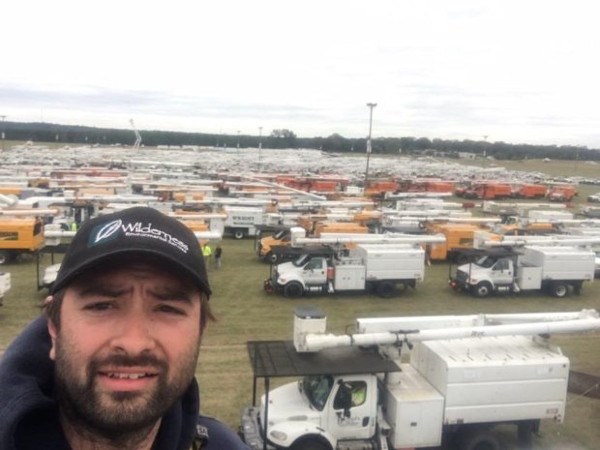Jake McClelland says he’s never seen anything like the damage he’s currently seeing in Florida, left in the wake of Hurricane Irma.
McClelland is a utility arborist with Wilderness Environmental Services. He is part of the 21-man crew from the Sault’s Wilderness Environmental Services team which volunteered to head south and help clean up the damage left by Irma.
The hurricane mercilessly battered several Caribbean islands and Florida, leaving 69 dead, colossal property damage, and nearly seven million people without power in Florida alone, with 13,000 living in shelters in the Sunshine State.
“We saw the ice storm in 2014, Toronto was devastated, but this is a whole other ball game,” McClelland told SooToday in a telephone interview Thursday.
“In Toronto, typically the ice was weighing the limbs down, so limbs were breaking down and taking the power lines down with them. We would have to get the limbs off the wires and once the wires were back in the air they were able to turn the power back on, though there was a lot of line repair.”
“But here, it’s all line repair. The trees aren’t crumbling from the top down, they’re crumbling from the ground down, so the entire tree is on a power line,” McClelland said.
“There are trees and power lines down across back yards, across fences, across roofs. It’s super bad.”
Wilderness Environmental Services is one of many tree care and utility companies from elsewhere in Canada and the U.S. clearing away downed trees while other crews work to restore power to Florida.
Thankfully, the crew didn’t experience the full wrath of Hurricane Irma.
“We travelled down to Perry, Georgia on Friday (Sept. 8) and we arrived there Sunday, and we basically rode out the storm there…we didn’t really get hit super bad with the storm, it was a tropical storm by the time it got to us.”
Now, however, the men are witnessing the aftermath.
“After that, we mobilized down into St. Petersburg, Florida, that’s where we’re working out of now.”
“There are trees down, poles down everywhere,” McClelland said.
McClelland said he has been informed there are 280,000 Duke Energy customers without power in Florida, “but every day we’re getting people back online.”
The group of 21 Wilderness workers from the Sault is broken down into groups of two or three to work with Florida utility crews.
The men are working 16-hour shifts.
“We’re now in accommodations but when we first got here there was nothing, every hotel was packed up, we weren’t able to get accommodation,” McClelland said.
“The power companies do put you up with lodging, whatever they can get they’ll get you, but at first we slept in our trucks.”
“I slept in the front seat of my pickup, we stayed in a Boy Scouts camp, there were guys with tents set up, there were bucket trucks, and I mean thousands of bucket trucks, and guys with air mattresses sleeping in the backs of the bucket trucks, on the roofs, wherever they could.”
McClelland said Wilderness crews are taken to the power company’s yard after rising at 4 a.m. for breakfast and a briefing, and are then assigned to where they are needed, beginning work at 5 a.m.
“They need us everywhere.”
“Right now we’re on a side road, clearing some trees, and when we’re done we’ll call the linemen and they’ll come and start putting the poles back in and we’ll assist them any way we need to,” McClelland said.
“Then comes lunch, the power company does lunch delivery and they provide all meals for us, water, anything we need, so that’s great.”
The crews labour on after lunch, throughout the afternoon and into the evening, stop work at 9 p.m., have dinner and are debriefed, then head back to their hotel for 10 p.m., bed down at 11 p.m. and rise again at 4 a.m.
Yesterday, McClelland said, the men were working in temperatures of 40 degrees Celsius, 60 when factoring in the humidex.
“Oh yeah, it’s warm. It’s tiring, but the energy seems to come from somewhere. We’re still moving at a good pace.”
McClelland said he and his crew have seen heart rending scenes of families whose lives have been turned upside down by Hurricane Irma.
“They’re everywhere.”
“Every road we turn down, there are people who just don’t know what to do with themselves. Their houses are destroyed.”
“It’s hard, you’ve got to give them support but there’s a lot of work to do. But the people are great to us, they’re bringing out water and sandwiches and whatever they can, the power companies are providing the same to us, but it is heart felt, to feel the love from the people.”
McClelland said the Wilderness group will stay in Florida “for as long as it takes.”
“It’ll be two weeks to a month at minimum. Some of our guys may have to leave (and come back to the Sault) for personal reasons, but the team we have here is pretty dedicated, so I imagine most of them will stick it out as long as they need to.”
The Wilderness workers are indeed being paid for their labour, but have all left spouses and children behind in the Sault and area to help out in Florida said McClelland, who has a wife and child here at home.
“We talk daily, we have texting and Facebook. We all feel the love from everyone up north, and it definitely helps us push on.”
Here at home, Rob Brewer, Wilderness Environmental Services president, gets an update from his men every three hours.
“We’ve had some stories come back (about the damage left by Irma), but it’s more about how appreciative people are that we’re there, people having their pictures taken with the Canadians.”
“There was a woman taking a picture with her kids and a crew…the crew continues to make us proud,” Brewer said.
